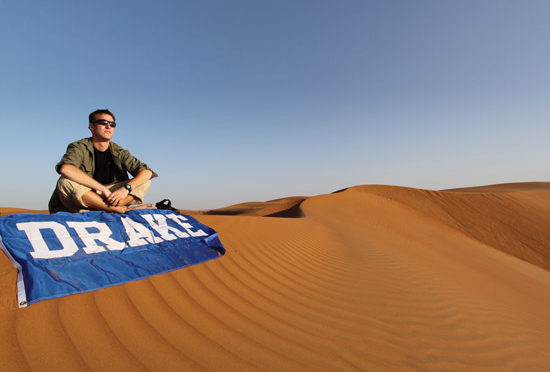If you have not contacted Annique Kiel about your interest in leading a J-Term 2017 travel seminar, please do so ASAP at annique.kiel@drake.edu or by calling 271-3039.
Proposals for J-Term 2017 travel seminars must be submitted to the appropriate college/school curriculum committee by Nov. 6, 2015. Please contact Annique with questions on this process.
Repeat offerings:
If your travel seminar was approved under the new process last year (approved in fall 2014 or after), and there are no significant changes to the syllabus or itinerary, it does not need to be re-reviewed by the school/college curriculum committee. You still need to inform the school/college curriculum committee that you wish to offer the course again, so they can move it forward through their process. School/college curriculum committees need to approve it, even if they do not need to review it again.
New travel seminars:
Faculty/staff members proposing new travel seminars will need to provide curriculum committees with a draft syllabus and draft itinerary, plus a credit calculation worksheet, curricular evaluation, and routing forms, which can be found online.
Please also provide answers to the following questions:
A. Curricular evaluation:
- How does the course meet curricular requirements (major, minor, AOI, etc.)?
- How is course content and delivery enhanced by the international or domestic location?
- How does the course propose to integrate students into the host culture?
- How do proposed excursions or site visits link to the learning objectives of the course?
B: Best Practice: (Please note answering no to these questions does not mean that your proposal will not be accepted. Rather, it helps the Drake International staff with the planning of your proposal should it be accepted by the appropriate curriculum committee.)
- How familiar is the lead instructor or co-leader with the proposed international location (e.g., professional connections, experience visiting/living/working there, language abilities, etc.)? If neither have prior experience, please note there is financial support available through Drake International for travel seminar scouting trips.
- Has the faculty member successfully taught the proposed course or a similar course at either Drake or through another academic institution?
- Is the proposed course being offered in collaboration with a university abroad? Does Drake currently have a formal relationship with that university? See list of current partner universities.
- Is service-learning included in the curriculum? If so, has an appropriate organizational partner been identified to facilitate service-learning activities on site? If you plan to incorporate service-learning in the travel seminar, please connect with Drake’s Office for Community Engagement and Service-Learning.
Final selection of J-Term offerings:
Should more than 15 J-Term 2017 travel seminars be proposed, a subcommittee of the Global/International Policy and Academic Council (GIPAC) will decide which seminars that have been approved by the appropriate curriculum committee will go forward this year. The criteria used to make these decisions will be:
- Geographical distribution
- School/college distribution
- Whether or not the course is offered in collaboration with one of Drake’s international strategic partners
- Distribution between new and repeat offerings
- Whether the course emphasizes community engagement/service-learning
- The degree to which the program integrates the site’s location/culture
- Input from the appropriate department chair and/or dean.
Compensation:
Compensation for a three-week travel seminar (defined as at least 14 days of travel) will be $6,800 for the instructor, $1,500 for the co-leader. (Per HR policy, compensation is lower for Drake staff members that are instructors or co-leaders on travel seminars.) If the course has co-instructors (two people both responsible for the academic component of the course—assignments, grading, etc.), the co-instructors will each receive $4,150. Should the travel seminar involve less than 14 days of travel or less than 3 credits of work (as indicated by the Credit Calculation worksheet), compensation would be reduced. We can clarify the exact amount based on the specifics of the travel seminar in question. Finally, note that for a 3-credit travel seminar, an instructor or co-instructor (though not a co-leader) in a J-Term travel seminar, can, with permission of the department and the appropriate dean, replace monetary compensation with a course reassignment.
—Submitted by Drake International

